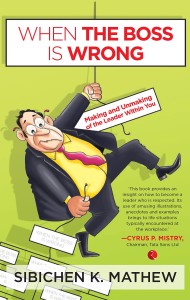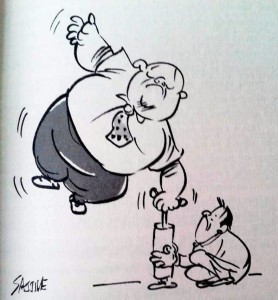I am sure anyone who has worked under a supervisor has felt troubled by their boss at one time or another. It may have been because your boss likes to micro-manage, or because he expects you to do personal stuff, or because his behavior is not professional and neutral. Whatever your reasons, most of us feel this disconnect with our boss at some time and the biggest casualty of this emotion is work.
In When the Boss is Wrong, Sibichen Matthew explores the myriad reasons employees feel that their boss is not what he should be and the effects of this discontent on the organization. Instead of talking about the qualities of a good boss that most other books do, the author aims to point out the negatives to become a good boss.
Dr Sibichen Mathew is a post graduate in Sociology. He received his MPhIl from JNU and PhD from Bharathiar University. He also did his post graduation in Public Policy and Management from IIM, Bangalore and LLB from Karnataka State Law University. His website is www.sibichen.in
 When the Boss is Wrong: Making and Unmaking of the Leader Within You
When the Boss is Wrong: Making and Unmaking of the Leader Within You
Author: Sibichen K. Mathew Paperback: 288 pages Publisher: Rupa Publications India; First edition (6 May 2015) Language: English ISBN-10: 8129136821, 978-8129136824
The author points out early on that the book is not about how to be a good manager or leader, but how to be a good boss. A good boss may not be a good manager and does not necessarily have to be a leader as each of these functions are very different. A person may not be either a manager or a leader, but be called upon to be a boss.
When The Boss is Wrong has come out of meticulous research and the author explains the research methodology in brief at the start of the book. The reasons what people dislike most about their bosses is a result of surveys and informal interviews of thousands of participants who have worked in different capacities and at different levels in different types of organizations.
The author covers the often reported “Horrible Bosses” scenarios, where the boss is a bully or completely uninterested in his current job and takes every opportunity to wiggle out of a difficult situation. Then there are bosses who like to parade achievements of the team members as their own to earn some brownie points from their bosses.

CEO: Chief Ego Officer
Sibichen discusses each of these situations in a story like, lighthearted narrative along with some very funny illustrations to keep the reader entertained. He also points out that all the problems employees experience are not entirely their boss’ fault and at times they themselves too need to introspect.
The prescriptions at the end of each chapter talk to each of these roles: the boss, the subordinate, and the organization as whole. The readers can definitely identify with a few of these negative traits and even connect a few to themselves or their current and past bosses. And along the way make sure that they do not fall in these unwanted, disliked behavioral patterns as bosses or subordinates.
The author has managed to stress the negative traits in every employee and the role organizations must play in this. The most damaging impact of all this negativity is loss of productivity. When The Boss is Wrong is a book I would like to see in every organization’s library or strewn across lounges and coffee tables.